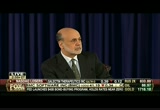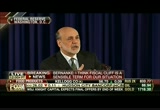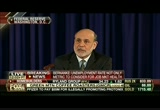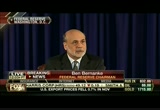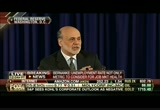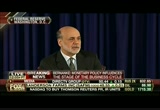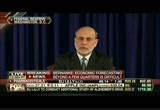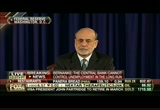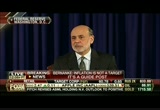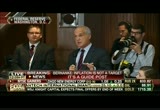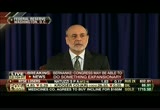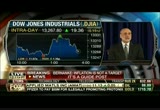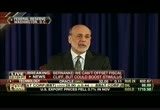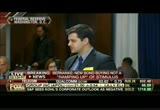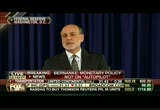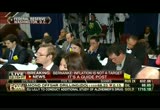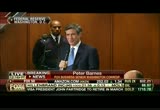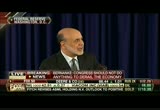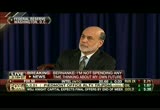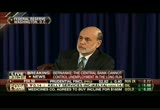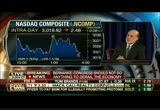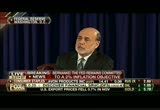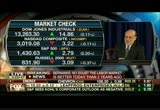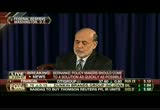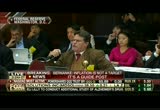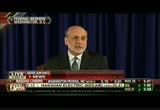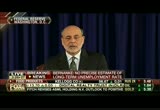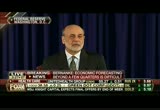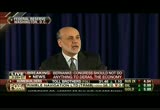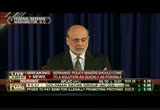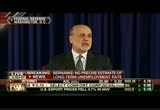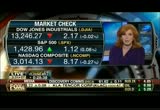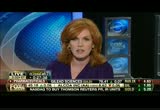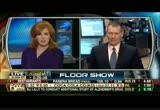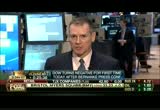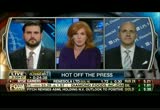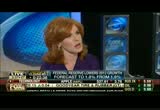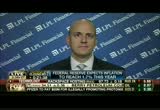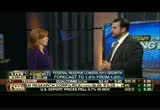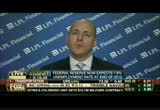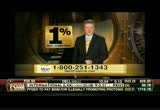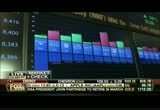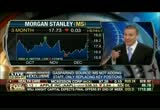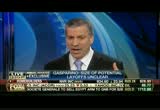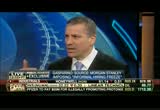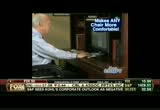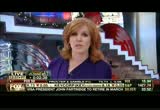tv Countdown to the Closing Bell FOX Business December 12, 2012 3:00pm-4:00pm EST
3:00 pm
[inaudible] >> the action taken -- >> given those actions it will be three years until you achieve your goals. is the message to people who are unemployed basically we're doing all we can? is this the conclusion that given that balance of factors this is the most we can expect? >> first of all, the projections you are looking at is based on each -- this is not committed collective production. what they are is 19 separate participants making their own projections based on their own views of optimal policy so for example includes those folks who think we shouldn't be doing any more purchases and their forecasts are included as well. it is not exactly apples-apples comparison. but it is true that if we could wave a magic wand and get unemployment down to 5% tomorrow we would do that but there are
3:01 pm
constraints in terms of the dynamics of the economy, in terms of the power of these tools and in terms of the fact that we do need to take into account the possibility of other costs and risks that might be associated with a large expansion of our balance sheet. [inaudible] >> just following up on that last question, how helpful would it be to see as part of the fiscal cliff resolutions and near term stimulus? the president has proposed that. how helpful d think that will be and i will ask my follow-up now. what ever happened to your southern accent? >> on the second one, i would like to think i am bilingual. when i go home sometimes it comes out pretty strongly but i won't try to do that here. i try to be careful as you know,
3:02 pm
not to give views on specific tax spending programs. of course, those are the province of the administration and congress. the attitude i have taken has been the at a minimum congress should try to do no harm, they should try to avoid policies that significantly slow or derail the recovery. that is the critical thing along with long term objective of achieving a sustainable fiscal path. given that basic recommendation congress can consider variations. for example if they believe they can achieve a strong, credible future path for fiscal policy that will give them potentially some space to do something more expansionary in the short term
3:03 pm
but those are judgments congress has to make about whether they can simultaneously continue support of fiscal policy in the short term and maintaining the credibility that in fact they will be addressing our structural deficit problem long-term. that is really a question for them and their staffs. [inaudible] >> booking over the past year or several years, how would you evaluate the fed accuracy making economic forecasts and how does that affect the ability to make monetary policy decisions connected to the threshold? >> it is fair to say that we have overestimated the pace of growth, total output, gdp growth from the beginning of the
3:04 pm
recovery and therefore had to continue to scale down our estimates of output growth. but interestingly, at the same time, we have been more accurate, not perfectly accurate but somewhat more accurate in forecasting unemployment. how do you reconcile those two things? i talked about this in remarks to the economic club recently before thanksgiving. and i think the reconciliation is what we are learning is at least temporarily, the financial crisis may have reduced somewhat the underlying potential growth rate of the u.s. economy. it has interfered with business creation, investment, technological advances and so on. that can account for part of the growth. at the same time, what monetary policy influences is not potential growth, not the
3:05 pm
underlying sexual -- many different kinds of policies affect that. what monetary policy affects primarily is the state of the business cycle, the amount of excess unemployment or the extent of recession in the economy. there i think we have also perhaps underestimated a bit the recession, but we have been much closer ritter and i think therefore that we have been able to address that somewhat more effectively with quite accommodative policies. that being said, we have over time as we have seen disappointment in growth and job creation we have obviously as we did in september added accommodation and we have continued to reassess the outlook. it is only fair to say economic
3:06 pm
forecast beyond a few quarters is very difficult. what we are trying to do is create a plausible scenario which i think is reasonably likely. be prepared to adjust as new information comes in and see how it changes and inevitably it will. [inaudible] >> thank you. economists have long believed central banks cannot affect the unemployment rate in the long run. that is when you have seen a move toward central banks being given mandate for low inflation only. can you explain if the fed by tying its monetary policy explicitly to an unemployment threshold of that is consistent or inconsistent with a longstanding view and if it is consistent how is it to. having a threshold for inflation only and with the approach you are not taking be possible if the fed had only a mandate for low inflation?
3:07 pm
>> it is entirely consistent with your view with the point that you made. let me reiterate it. as we stated in our january set of principles, the central bank cannot control unemployment in the long run. i wouud add a caveat which is very extended periods of unemployment can interfere with workings of the labor markets. if the fed were not to address a large unemployment problem for a long time it might have influence over the long term unemployment rate but as the general rule i think this is the right baseline. long-term unemployment rate is determined by a range of structural features of the economy and range of economic policies and not by monetary
3:08 pm
policy. that being said, what our 6.5% threshold is as i said in my opening remarks is not a target. what it is is a guidepost in terms of when the beginning of the reduction of accommodation could begin. it could be later than that at least by that time, no earlier than that time. so it is really more like a reaction function or taylor rule if you will. i will be ready to get a phone call from john taylor. it is not a taylor rule but has the same feature that relates policy to observables in the economy such as unemployment and inflation. what it is doing is saying how our policy will evolve over time as the economy evolve. it has no implication we can
3:09 pm
affect the long run unemployment rate which we believe is lower than 6.5%. is somewhere between 5% and 6% of according to s e p projections. we are dual mandate central bank and i think providing information on both sides is more helpful. i understand your point but providing information on unemployment and inflation gives more information to the markets, to the public that allows them to infer how our policy is likely to evolve. >> you said earlier -- [inaudible] >> so long as the inflation condition is met. that is correct. [inaudible] >> i still like to hear a little bit more about why you made this
3:10 pm
announcement today, specifically tying federal funds and your policy to the 6.5% number? i am sure you hhve a theory about what you hope changes in the economy as a result of this announcement. if so, what is it? >> we think it is a better form of communication. we think by using our threshold which ties rates to economic conditions we are more transparent about what is going to determine our policy in the future, the date based guidance served a purpose but had the problem that whenever economic outlook changed, and the committee was faced with the question whether we should change the date based guidance and we did change it a couple times that that was a non transparent process. nobody understood exactly why we made a particular change because we were not providing fundamental information about how our policy is linked to the
3:11 pm
underlying outlook. i believe this approach is superior. i am not saying it is the best possible approach. we are always looking to improve communication. i do think it is more transparent and will allow all the markets to respond quickly and promptly to changes in the outlook by adjusting when they think rating freezes will begin and therefore it will act as a mix them like an automatic stabilizer. if the outlook worsens and leads markets to think that if the increase in rates is further in the future, that will lower long-term rates and that will tend to be supportive of the economy. that has an automatic stabilizer affect that offset the adverse shocks. it is a better form of communication. we discussed extensively at the last meeting and frankly, given that it is a relatively complex change it seemed like it would be a good idea to do it at a meeting where there was a press
3:12 pm
conference. we decided since we were ready to go, why not make the change earlier and get the benefit earlier. >> as a quick follow-up did you see a level of uncertainty in the business community that you hope to solve by this announcement? >> at the moment, i think that the expectation of the business community and federal open market committee happen to be pretty well all lined. if you look at the financial market indicators, future of federal funds rate path, it is consistent with the mid 2015 date based guidance we have been providing. i am not saying there was a major inconsistency between what the business community was expecting more markets were expecting and what we were expecting, that was not the issue. the issue was looking forward, what happens if there's a
3:13 pm
significant change for better or worse in the outlook, under date based guidance requiring the committee to determine what the date is and to make the change, in a non transparent way, but under this threshold based guidance the markets and business community can make that calculation on their own and adjust their estimates of when rates will begin to increase based only on their own forecasts and not have to wait for the federal open market committee to give them a date. we think it is a better approach. [inaudible] >> mr. chairman, bloomberg news. by 2015 the recovery will be six years old. the average postwar recovery has been a little less than 5. we are banking on a very long expansion. you expect by mid 2015 the funds rate will be at zero%, the
3:14 pm
balance sheet is potentially $4 trillion. of the business cycle runs out of steam and your stomach zero% interest rates does the fed no longer have a forceful response in that situatton? >> the fed will always -- we have innovated quite a bit in the last few years and it is always possible we can find new ways to provide support for the economy but it is certainly true. there is no doubt that with interest rates near zero and the balance sheet already large that the ability to provide additional accommodation is not unlimited. and that is a reality. that actually is an argument for being more aggressive now. it is a really good objective to get the economy moving, to get some momentum, that protects the economy against unanticipated shocks that might occur and gets us off of the zero bound
3:15 pm
earlier, so exactly for those reasons the kind of risks that a rise when policy interest rates are close to zero and the greater difficulty of providing additional policy support is an argument for being more proactive now when we have the ability to do that and try to get the economy back to health conditions. [inaudible] >> my question pertains to the volcker rule. regulators earlier this year came cautiously optimistic they could finalize the rule by the end of the year. that seems a bit unlikely at this point and as you know, lawmakers are calling for utley to yuri implementation bill and a rule. given the fact is such a lengthy process can you tell us where things stand? how much closer are we too are a final rule, have agencies worked out there differences and if you made a prediction on what we
3:16 pm
might actually see a rule? >> we have made quite a bit of progress. is a difficult complex rule as you know and i think i recall 18,000 comments or something like that. so it is a lot to look at. there are a lot of concerns that arose even from foreign, enters about the effect on the bond markets. so a lot of work to do. i think there is quite a bit of agreement. i won't save final agreement but quite a bit of agreement on key points among regulators at this juncture and if congress gives some other instruction we will follow that we have not received any different instructions so it is our intent to get this done early in 2013. >> peter barnes, fox business. since your last press conference we have had an election. one of the candidates in that
3:17 pm
election, mitt romney, said he would not reappointed to a third term as chairman. president obama did not weigh in on the issue but he did win reelection. if the president were to call you and say your country needs your continued stewardship at the federal reserve, we need you to stay and finish the job, see this through, would you consider it, would you do it and by chance if you had any conversations to that effect with the president or anybody on his team, thank you. >> to answer the last part, i haven't had any conversations. i think the president has quite a few issues he needs to be thinking about from fiscal cliff to many other appointments and so on. for my own perspective i really don't have anything to add from the last press conference. i am very much engaged in difficult issues we are
3:18 pm
discussing today and have not been spending time thinking about my own future. i don't have anything to add. [inaudible] >> two questions. one having to do with the c p is and a lot of debate about the john boehner plan and the cpi not as fed chairman but economists. is very logic in going -- do you think it is a move that should be done separate from the politics of it? and with your comments at the labour market you talked about the importance not looking at 6.5% threshold but broader conditions, a big debate, people being beamed to mars. what is happening in the job market? are we creating jobs? is that is why it is coming down or is it because of discouraged workers? what is your sense of how quickly it has fallen because of
3:19 pm
new employment? >> on the first question, the cpi, the six weeks tp i, the technical issue, technically better according to most economists because it allows for changes in the mix of goods and services that people actually consume more effectively. however, whether that is more appropriate for social security indexing or not it is also a political decision. i suppose a rejoinder would be neither the cpi nor the joined cp i is a good measure of cost of living for social security recipients. those are the kinds of questions that congress is going to have to deal with. the second part of your question -- [inaudible]
3:20 pm
>> the debate over the extent to which unemployment rate has fallen. >> you can see the comparison by looking for example at the household survey which gives estimates of how many people are added to the labour force and how many people are added to the employee or leading labour force and it is true that part of the decline in unemployment and indeed all of it in the last reading, over the recovery, part of the decline in unemployment has come from declines in participation rates, people leaving the labor force. some of that decline in anticipation appears to be due to longer run factors, aging and changing patterns of work among women. those things were probably not directly related to the
3:21 pm
recession for example. but beyond that downward trend is additional decline in labor force participation and ratio of employment to population which presumably is linked to discouragement about the state of the labor force. so that certainly is part of the issue. that being said there has been a good bit of job creation. you see that in household survey or in the payroll establishment survey. there is no dow labor market is considerably better today than it was two years ago. there's no question about that. is also the case that many indicators in the labour market remain quite weak, ranging from the number of long-term unemployed, people who have part-time work who would like full time work, wage growth is
3:22 pm
obviously very weak. i could go on. it may be that the labor market is even a bit weaker than the current unemployment rate suggests, but it is never the less the case that there has been improvement since the trough of couple years ago. >> catherine -- [inaudible] >> national journal. how concerned are you that markets will have to take to get lawmakers to reach a deal on the fiscal cliff and what you make of their recent complacency? is there a wall street washington disconnect? >> interesting question. i certainly hope markets will have to tank. i certainly -- we want to have confidence not just in markets but businesses and households as well and the best way, for fiscal policymakers can achieve
3:23 pm
that is by coming to a solution as quickly as possible. markets have already responded to some extent the band down. you see from day to day how they respond to news about negotiations. on the other hand it is also true, if you look at the experience, very informative experience of the debt limit debate in august of 2011, both confidence and markets remain pretty sanguine, of to pretty close to the point that it looked like there was a chance the debt limit would not be raised. and then, of course, there was a shark shark particularly to confidence about the time of the
3:24 pm
final debates. it is not unusual to see markets being complacent. of course, there is market point of view, risks in both directions, hings go badly but perhaps if things go well, that would be good news and may be right now markets are taking an average of those two possibilities but just to reiterate, i don't think any policymaker including the fed should be responding to markets, what we should be doing is making policy based on fundamentals and doing what is best for the economy and i hope fiscal policymakers will follow that injunction as well.
3:25 pm
>> mr. chairman, market news international. with the federal government borrowing roughly $1 trillion a year and now with the fed on pace to by roughly a trillion dollars a year in bonds, are you concerned about a public and possibly global perception that the fed is accommodating not just growth but accommodating federal borrowing needs? are you concerned about what this might do to the fed's credibility and the credibility of u.s. finances in general and the credibility of the dollar as the world's leading currency? >> first of all couple facts. we are buying treasurys and mortgage-backed securities, about half and half roughly. we are buying considerably less than the treasury is issuing and
3:26 pm
moreover, the share of outstanding treasuries the federal reserve phones is not different from what it was before the crisis because while our holdings have increased so has obviously the stock of treasurys in public hands. it is not quite evidence that there has been such a radical shift. we have been increasing our balance sheet for some time, we have been very clear that this is a temporary measure. it is a way to provide additional accommodation to any economy that needs support. we have been equally clear that we will normalize the balance sheet that will reduce the size of our holdings and whether by letting them run off or by selling assets in the future, and temporary staff, he would be a different matter of we hold these assets in definitely. that would be a modernization. we are not doing that. we are clear about our
3:27 pm
intentions. i think until now, seems our credibility has been good. there has not been any sign of current inflation or of any strong evidence of any increase in inflation expectations. looking at the surveys and economic forecast and so on. so this is one of those things we have to look at. remember i talked earlier about the large balance sheet. we want to make sure there's no misunderstanding, that there is no inflation expectations based on the size of our balance sheet. that is the one thing we want to look at. as to this point, there really is no evidence people are taking it that way. we are pointing out, we have been very focused on the united states here, but we're not the only central bank that has increased the size of its balance sheet.
3:28 pm
japanese, the europeans, the british have all done the same. very much more or less the same extent of gdp, the sophisticated market players and the public understand this is part of a collective need, you need to provide additional accommodation to weak economies, not accommodation of fiscal policy. >> last but not least, greg, marketwatch. this seems to be growing evidence some of the purchases impact banks are holding onto some of the games and not passing them on to the borrowers. this image you can do about that, and are you concerned about that? >> the question is about spread between the mortgage rates the
3:29 pm
public pays and yields to mortgage-backed securities banks may hold, and the question is is that spread widening so that the full benefit of the reduction is not being passed through, that is the question. i want to make sure everybody heard it. our analysis suggests it takes time, two points for the first point is while we don't expect 100% to pass through, imperial and theoretical analysis, we have had quite a bit of work done on this issue suggests over time the great majority of the decline gets passed through to mortgage rates so we do
3:30 pm
anticipate over time that the full benefit or that mostly benefit will be seen by retail customers and indeed we have seen already a pretty significant decline since september in retail mortgage rates. one thing that is perhaps confusing the issue a little bit is there are other things happening in the economy which are affecting those spreads. for example, the capacity limitations, allowing banks to charge higher yields. there is extra cost like put back risk, higher from a number of things happening in the economy, which would tend all else equal, studie so that is unfortunate.
3:31 pm
we want to encourage good policy, put backs reducing the risk to banks in making mortgage loans. again, most of those things are not really in our control, but again taking all those issues as constant, it does seem to be the case over a period of time, most of the claims to find their way to mortgage customers and thereby strengthen the housing market. >> thank you very much. >> fed chief ben bernanke, he should have quit at hello. the market lost all of their games plus a point. 6.5%, that is the point say unemployment rate at which ben bernanke says any future rate moves will now be tied.
3:32 pm
a news conference in washington, he emphasized his top priority now shoring up the job market. the decision to live up the printing presses in january. the fed investors said they will not stop buying bonds until they drop. 85 alien dollars and we created money each and every month, 45 billion of that put in longer dated treasuries. by mortgage-backed securities. dow jones industrials really straddling the flat line. up more than 81 points after the announcement of markets like this announcement and started to take a second look. the nasdaq has been down most of the day. investors gave the plan a thumbs-up and saw stocks at their best levels since october
3:33 pm
but giving up the games as you see, what went on. big intraday swings around 12:30 p.m. eastern when the fed made the decisions known. take a look at the financials, giving us a sense of how sensitive it got. as you can see, pulled back half a percent to the upside at the moment. bank of america, jpmorgan, citigroup, wells fargo, all of them in the green but not as far as they have been. in economically sensitive group. up about 1.5%. similar story for dupont, gold corporation holding onto most of its leads. let's find out what the traders made of it. you were there in the thick of
3:34 pm
it at the new york stock exchange. >> as you say, he hadn't said hello and left us at the altar started talking. this is the difference between what the policy says and the reality underneath the policy when the fed chairman, ben explains what they're doing. number one is that we determined the advocacy of the e-zines is not doing the trick, they will go to plan b., whatever that is. he said they do not have an unlimited bazooka so to speak to do this. that put a reality on the market. ultimately what will happen is they will put in a lot of money out to the marketplace for some time to come, and now have tied to 6.5% if not lower. the real issue they have, looking at things like the
3:35 pm
velocity of the money supply. it is just not making its way to the general economy, this being held at the banks and the businesses and until that happens, we will not see unemployment come down and will not see gdp growth. liz: there are unintended consequences. thank you very much. what does the fed's latest move mean for your money and how you should be investing? fox business exclusive with two super experts. chief market strategist. you guys just heard what he said, and it is true, we wonder where the money is going. three years ago when the fed started this bouncing castle of adding all the money, the market bounced and it beautifully. people watching want to know what they should do with their money and their investments.
3:36 pm
>> the curveball we got from the fed today was they didn't really extend the rate guidance at all. ben bernanke reiterated around the middle of 2015 or when employment rate begins to fall. that puts a negative around the unemployment rate. liz: tell people why. i thin think you are right, as e start to see the jobs numbers come back, they will say wait a minute, the government trade has been so good to my investment will be gone. >> particularly in areas like homebuilders probably will be a great investment for a while longer. as the unemployment rate begins to decline closer to the 7% threshold, it may begin to stop and look at selling some of these assets as we get to 6.5%. good news becomes bad news for
3:37 pm
housing, which has been the key for the economy. liz: george, let's bring you in here. did anything surprise you about what we saw today? what happens and how the fed behaves to a 6.5% unemployment rate is what ben bernanke said is historic, is it not? >> the fact that they keep having to come back and do it, the fact they keep going back is the problem is not resolved. it is being put on because they needed more help. liz: we all know that, but the government trade, the fed has pushed people into riskier assets, but are those riskier assets giving us as much yield any more? corporate bonds have done it crowdeacrowded trade.
3:38 pm
if you look at the corporate, the yield is just slightly below the s&p, so i spent people go into equities? >> or the worst risk is liquidy where people think the opportunity is cash next to nothing. liz: what we have here, dividend yields, 1.85%. >> at the end of the day the goal is to force people out to sponsor the natural habitats. will people really want to part with their money? liz: is there an unintended consequence with inflation? it really hasn't happened yet but i think more than a year now warren buffett had the op-ed saying watch out. when you add this much money to a system that at some point look
3:39 pm
at the dollar, the dollar is tanking against the canadian dollar come against the euro and other major currencies. >> the second last question to ask is what is this doing to the dollar. we are not the only ones doing this. it is a race to the bottom in a competitive devaluation of currency. the yen has been plunging but the dollar is down. something that holds a stable value as a world currency continues to decline. relative to stores of value. that could be we take way. >> at the end of the day realized is overextended for many years and the only way to pay it back is inflation. liz: does it hurt my chances to make money in a 401(k), my investment?
3:40 pm
>> they want to keep some sort of status of living, right? the goal is really about relative, not just an absolute return. liz: ben bernanke thought about these things, has he not? is he just up against a wall here? >> it is not just he is up against a wall, but all the central bankers are. they all own 25% of their income anin gdp assets on the central bank balance sheets. liz: should we be shredding the dollar into confetti just so we can sacrifice it for equities and get people back into the market? is that a bright thing to do? >> it may not be the greatest thing to do for an investment perspective. these feeling like he is forced to do that growth he is feeling
3:41 pm
a strong dollar appreciation which would not be good trying to generate 40% of sales coming from overseas could be a real negative for corporate america weighing further on hiring and more pressure on the near-term on the economy. liz: we're all in the same boat covers what you are saying. what do you recommend at this point? are people might get some decent deals on their investment. >> let's see what happens at the start of the year. the fiscal cliff is not resolved, europe people think is resolved, recommending people go down the curb in terms of yield. less than four to five years of overall average duration of portfolio but investors rather have the ability to invest in case inflation does spike. you have to hunker down for the
3:42 pm
next six months to see how the economy pans out and is resolved. liz: yesterday robert gray did a report on taxi medallions, am i missing something, is there some great trade out there? >> look at the emerging market. they're the exact opposite of the rest of the world. take a look around, you have an interesting opportunity in china as the economy we accelerated in recent months and they can spend money through stimulus and they are cutting rates because they have a long way to go. i have levers to pull the rest of the developed world has already pulled and the pedal to the metal so it could be some opportunities. liz: what happens to the market tomorrow, do we recover, yes or no? >> all the euphoria built up
3:43 pm
ahead of the meeting has been poured in the market and it will continue to go down. liz: a lively discussion on 6.5%, you will not see it until we hit that unemployment number. it seems like a long ways away. the closing bell in 16, 17 minutes. the hemorrhaging continues on wall street affecting morgan stanley but with a twist, breaking news from the firm straight from charlie gasparino. exclusive that you cannot miss. copd makes it hard to breathe,
3:44 pm
3:45 pm
signicantly improve lung function. unlike most copd medications, advair contains both an anti-inflammatory and a long-acting bronchodilator working together to help improve your lung function all day. advair won't replace fast-acting inhalers for sudden symptoms and should not be used more than twice a day. people with copd taking advair may have a higher chance of pneumonia. advair may increase your risk of osteoporosis tell your doctor if you have a heart condition if you're still having difficulty breathing, ask your doctor if including advair could help improve your lung function. get your first full prescription free and save on refills at advaircopd.com.
3:48 pm
liz: like we said, we should have left it hello. they liked the decision, the market popped and then dropped. nicole: right? the market would be up six days in a row for the dow jones industrials. we would be setting records back for nine months. we have not had a nice winning streak for that in some time, but what happened? the first red on the screen, there you go with, when ben bernanke begins to talk. some speculation over who would take the top spot and be the head of the fomc, obviously that will be so many names thrown around, have to tell you just to name a few. some of the most heavily traded most active stocks here on the floor of the exchange today. bank of america, aig, citigroup and sprint.
3:49 pm
four of the five are actually in the green, but not aig. liz: morgan stanley breaking news. the ceo put a lid on new hires and is now deciding whether to lay off more people with the big securities firm. how much and when, charlie gasparino. >> what they have right now according tforincreasing execute firm is informal hiring freeze, basically they are not adding staff. those are the brokers, they work on commission. they are not adding staff, only replacing key positions. it is the fourth quarter, but this is very interesting basically building up what we know will come in january. the ceo of morgan stanley will be deciding how much and if he will cut. more how much you will cut
3:50 pm
versus f. the decision isn't made yet. they will note in january, but they have approximately 55,000 employees, i think there's a good chance they will look at potential layoffs, equity and sales trading. a lot of talk of him getting out of commodities were even fixed income. some trimming in investment building. it is tougher, you are supporting big clients, that is what wall street does. i think as long as i it's not proprietary trading on your own behalf going out and taking proprietary deaths under the volcker rule's, you cannot do that kind of criteria trading.
3:51 pm
you can still support customers, thank god, which is what wall street firms do and you make money. that said, that is probably a place they will cut because of the various rules in effect. but we don't know. it is january. this is not the first round of layoffs in morgan stanley. maybe the third. but it does say something about wall street. wall street is very, very nervouu about the future even if we don't hit the fiscal cliff. wall street sort of fantasy would be to impose simpson-bowles. you do a radical change, close all the loopholes, that is probably not going to happen. we're lucky if we get some sort of a deal to get us beyond the fiscal cliff and budget cuts kick in. even take that out of it, they are just increasingly
3:52 pm
pessimistic about the future. tracy: you have dodd-frank coming, regulations for which you have to appear. >> morgan stanley is not cutting medicare, that is what happens with the fiscal cliff. liz: i think they took our comments from when citigroup led off people and said don't do that in december, we have to do it, and do it in november. >> he is a good guy. totally opposite, very rational, nice, smart guy. he does have a firm to run. and he has economic realities, giving you the economic realities of morgan stanley. i hear there could be cuts there as well. i don't think morgan stanley will go a deep as citigroup.
3:53 pm
i think they will do a little bit. we should also point out one other thing, covering 20 years overreacting for 20 years, they cut back and things got better and go crazy hiring so remember the pendulum of false both ways. liz: thank you. i am taking orders for chocolate. the holidays are coming up. >> how old are your kids? 11 and eight. liz: classic. the markets are not ballooning out. the s&p is coming back. the s&p ha has a little bit of green on your screen.
3:54 pm
3:56 pm
3:57 pm
so she's always ready to take action, no matter how wily... or weird... or wonderfully the market's behaving... which isn't rocket science. it's just common sense. from td ameritrade. liz: if you look at the clock, 12:30 p.m. eastern when the fed decision and announcement came down, he saw spikes everywhere look at the one in gold. a one-time up $13. in the fed announces all kinds of liquidity measures like the qe4 effort, that is dollar negative. it becomes a little bit of stupidity and commodities move higher. but still moving higher.
3:58 pm
$10 of the pretty significant gain. same with equities. exciting while it lasted. lots of red on the screen. let's get ready for "after the bell" with david asman. david: we have a new bill, here it is, $100 trillion. a lot of people are afraid with all the new money printing and modernization that we will start adding a couple of zeros read we will be asked a lot of people thought that in the coming hour. liz: so much volatility, possess a big win the announcement came out because equities rallied, less uncertainty, we knew what the fed was thinking and then they lost us. he talked during the press conference. what ar other traders saying tht turned them off to ben bernanke? nicole: what was really key was in the press conference he said
3:59 pm
we're basically ramping it up now and the doing all that money policy can now because in 2015 and the years ahead we don't know what we can possibly do to the fed saying we're pulling out all the guns now because later we have no idea how to save the day. david: let's talk specifics. netflix getting a huge pop even though its competitor, wayne starr launched a new service. what is up with netflix? nicole: they reiterated the buy rating. they have a potential to disrupt premium cable, the whole premium cable network as we know it. the vote of confidence the stock really took off. liz: all right, research in motion. that continues now up more than 79% in just the last three months.
108 Views
IN COLLECTIONS
FOX Business Television Archive
Television Archive  Television Archive News Search Service
Television Archive News Search Service 
Uploaded by TV Archive on

 Live Music Archive
Live Music Archive Librivox Free Audio
Librivox Free Audio Metropolitan Museum
Metropolitan Museum Cleveland Museum of Art
Cleveland Museum of Art Internet Arcade
Internet Arcade Console Living Room
Console Living Room Books to Borrow
Books to Borrow Open Library
Open Library TV News
TV News Understanding 9/11
Understanding 9/11